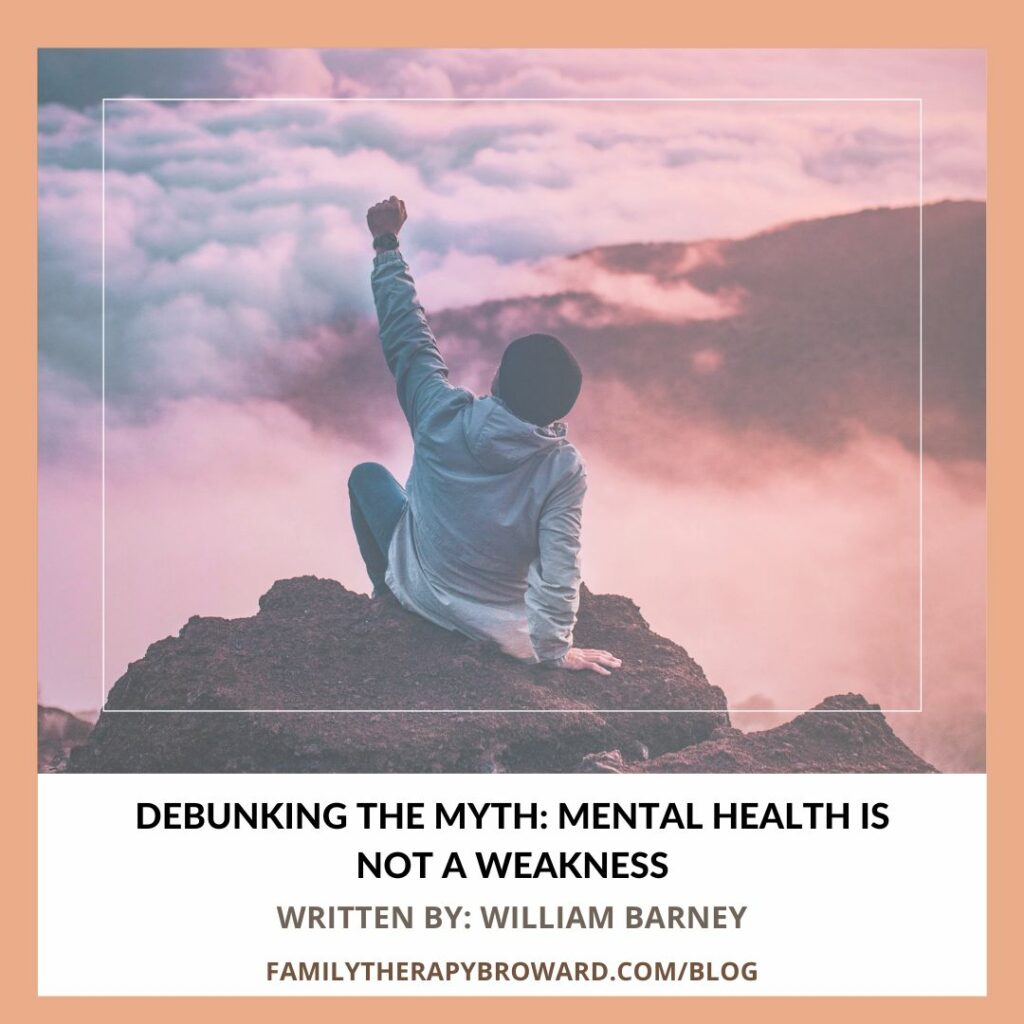
Debunking the Myth: Mental Health is Not a Weakness
Written by: William Barney
In today’s society, mental health is often stigmatized and misunderstood. One of the most pervasive myths is the idea that struggling with mental health is a sign of weakness. This misconception can be incredibly damaging, preventing people from seeking the help they need and fostering a culture of silence and shame.
It’s time to debunk this myth and recognize the truth: mental health challenges are not a sign of weakness but a fundamental aspect of the human experience.
The Origins of the Myth
The notion that mental health issues are a weakness likely stems from historical attitudes towards mental illness. For centuries, people with mental health conditions were often ostracized, institutionalized, or subjected to cruel treatment. These attitudes have slowly changed, and remnants of this stigma still linger in modern society.
Moreover, our cultural emphasis on strength, resilience, and self-reliance has contributed to the perception that admitting to mental health struggles is a sign of vulnerability. In a world that often glorifies toughness and stoicism, acknowledging mental health issues can be seen as a failure to live up to these ideals.
Understanding Mental Health
To debunk this myth, it’s essential to understand what mental health entails. Mental health encompasses our emotional, psychological, and social well-being. It affects how we think, feel, and act and plays a role in determining how we handle stress, relate to others, and make choices. Just like physical health, mental health is critical to overall well-being.
Mental health conditions, such as depression, anxiety, bipolar disorder, and schizophrenia, are not character flaws or signs of personal failure. They are medical conditions that result from a complex interplay of genetic, biological, environmental, and psychological factors. Just as we wouldn’t consider someone weak for having diabetes or heart disease, we shouldn’t view mental health challenges as a weakness.
The Strength in Seeking Help
One of the most damaging aspects of the myth that mental health is a weakness is that it discourages people from seeking help. This can lead to prolonged suffering, worsening symptoms, and a diminished quality of life. In reality, seeking help for mental health issues is a sign of strength, not weakness. It takes courage to acknowledge that you’re struggling and to take steps toward getting better.
Therapy, medication, support groups, and lifestyle changes can all be effective in managing mental health conditions.
These treatments require commitment, effort, and resilience – qualities that are anything but weak. By seeking help, individuals demonstrate their willingness to fight for their well-being and to build a healthier, more fulfilling life.
Changing the Narrative
To combat the myth that mental health is a weakness, we need to change the way we talk about and approach mental health. Here are some steps we can take:
- Educate Ourselves and Others: Understanding the reality of mental health conditions can help dispel myths and reduce stigma. Education can come from books, documentaries, conversations, and professional training.
- Share Stories: Personal stories of mental health struggles and recovery can be powerful tools for change. They humanize the issue and show that mental health challenges can affect anyone, regardless of their background or achievements.
- Promote Empathy and Compassion: Encouraging empathy and compassion towards those with mental health conditions can help create a more supportive environment. This includes listening without judgment, supporting, and advocating for mental health resources.
- Challenge Stigmatizing Language: Words matter. Avoiding language that perpetuates stigma and challenging others when they use it can help shift societal attitudes. Terms like “crazy,” “weak,” or “insane” should be replaced with more respectful and accurate language.
- Support Mental Health Initiatives: Supporting policies and programs that promote mental health awareness, research, and treatment can help make mental health care more accessible and practical.
Conclusion
The myth that mental health is a weakness is not only incorrect but also harmful. By understanding the complexities of mental health, recognizing the strength it takes to seek help, and working to change societal attitudes, we can create a more compassionate and supportive world. Mental health challenges are a part of the human experience, and addressing them with empathy and understanding benefits us all. Let’s work together to debunk this myth and build a society where mental health is treated with the importance and respect it deserves.
